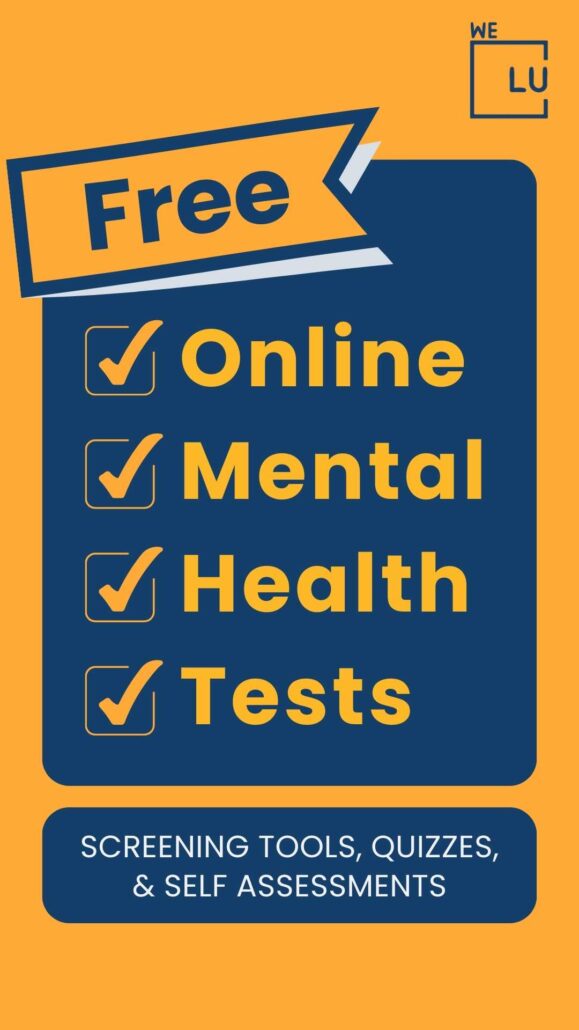Mental Health Disorders List
In today’s complex world, the significance of mental health cannot be overstated. As our understanding of mental health deepens, so does our awareness of individuals’ diverse challenges. This article delves into the mental health disorders list, providing a comprehensive list of types and offering insightful examples that shed light on the nuances of these conditions.
From subtle shifts in mood to more profound cognitive experiences, mental health disorders encompass many conditions that impact thoughts, emotions, and behaviors. Understanding the various types of disorders and their real-world examples enhances our empathy and aids in destigmatizing these conditions.
By recognizing and acknowledging the intricacies of these disorders, we can foster a more compassionate and informed society that supports and uplifts individuals on their paths to mental well-being.
What are Mental Health Conditions?
Mental health conditions, often called mental illnesses or disorders, are a diverse range of medical conditions that affect an individual’s thoughts, emotions, behavior, and overall psychological well-being. Just as physical health encompasses a variety of ailments, mental health conditions encompass a broad spectrum of challenges that individuals may face in their cognitive and emotional functioning.
Mental health disorders disrupt everyday activities, and these conditions can vary in severity, duration, and impact on daily life. Some mental health conditions are relatively mild and transient, while others can be chronic and significantly disrupt a person’s ability to lead a fulfilling life. They can affect people of all ages, genders, backgrounds, and walks of life.
Mental health conditions can be caused by genetic, biological, environmental, and psychological factors. Stressful life events, trauma, brain chemistry imbalances, and genetic predispositions can all contribute to the development of these conditions. Additionally, societal and cultural factors affect how mental health conditions are perceived and addressed.
For comprehensive and compassionate treatment of various mental health disorders, consider We Level Up Treatment Center, where a team of experienced professionals is dedicated to guiding you on your journey to recovery.


Skip To:
Learn More:
- How Can You Access Mental Health Services? Mental Health Services Near Me.
- CBT Therapy For Addiction And Co-Occurring Disorders, CBT Techniques and Treatment
- Free Online Mental Health Tests, Screening Tools, Quizzes, & Self Assessments
- Learn How to Cope with Depression. 10 Ways to Cope with Depression.
- Determine the Best Time of Day to Take Zoloft for Anxiety. How Long Does It Take for Zoloft to Work?
- ADHD Medication, Side Effects, Mechanism, and Effectiveness
Mental Health Disorder Definition
A mental health disorder, also known as a mental illness, is a clinically diagnosable condition that significantly affects an individual’s thoughts, emotions, behavior, and overall psychological well-being. These disorders can disrupt an individual’s daily functioning, relationships, and overall quality of life. Mental health disorders encompass various conditions, including symptoms, causes, and treatment approaches.
It’s essential to note that mental health disorders are medical conditions similar to physical illnesses. They are not a sign of personal weakness or character flaws but rather the result of complex genetic, biological, environmental, and psychological interactions. Seeking timely diagnosis and appropriate treatment from qualified mental health professionals is essential for managing these conditions and improving overall well-being.
Get Help. Get Better. Get Your Life Back.
Searching for Accredited Dual Diagnosis Mental Health Centers Near You?
Even if therapy failed previously, or are in the middle of a difficult crisis, we stand ready to support you. Our trusted behavioral health specialists will not give up on you. When you feel ready or just want someone to speak to about counseling alternatives to change your life call us. Even if we cannot assist you, we will lead you to wherever you can get support. There is no obligation. Call our hotline today.
FREE 24/7 Dual Diagnosis Mental Health Services HotlineMental Health Disorder Fact Sheet
Overview of Mental Health Disorders:
- Variety of Conditions: Mental health disorders encompass many conditions, including depression, anxiety disorders, bipolar disorder, schizophrenia, eating disorders, and more.
- Causes: These disorders result from genetic, biological, environmental, and psychological factors. Family history, brain chemistry, trauma, and stress affect their development.
- Symptoms: Symptoms vary widely based on the specific disorder but can include mood changes, cognitive distortions, altered perceptions, and behavioral disruptions.
- Prevalence: Mental health disorders are common worldwide. They affect Millions of people, making them a significant public health concern.
- Impact: These disorders can significantly affect daily life, relationships, work, and overall well-being. Severity varies, with some being episodic and others chronic.
- Stigma: Mental health misconceptions can hinder proper understanding, treatment, and support for individuals with these disorders.
- Treatment: Effective treatments include psychotherapy, medication, lifestyle changes, and support groups. Early intervention is crucial for better outcomes.
- Recovery: Many individuals with mental health disorders can lead fulfilling lives with proper treatment and support. Recovery is a journey unique to each person.
Mental health services encompass a range of professional interventions to promote mental well-being, treat mental illnesses, and support psychological challenges. These services are vital for individuals seeking guidance, treatment, and tools to effectively manage their emotional and mental health.
Types of Mental Health Services:
- Therapy and Counseling: Trained therapists offer individual, group, or family therapy sessions to address emotional issues, improve coping skills, and foster healthier behaviors and thought patterns.
- Psychiatry: Psychiatrists, medical doctors specializing in mental health, diagnose and treat mental illnesses. They can prescribe medications and provide therapy to manage conditions like depression, anxiety, and bipolar disorder.
- Support Groups: Peer-led or therapist-facilitated groups allow individuals with similar experiences to share, learn, and find emotional support.
- Online Mental Health Services: Virtual platforms provide remote access to therapy and counseling, making mental health support more convenient and accessible.
- Emergency Mental Health Services: For acute crises, these services offer immediate intervention and stabilization for individuals in distress.
- Preventive Services: Awareness campaigns, education, and early intervention initiatives focus on preventing mental health issues and promoting well-being.
- Community-Based Services: Local programs and initiatives address mental health needs within specific communities, ensuring accessibility and cultural sensitivity.
Mental Health Disorders Statistics
In today’s fast-paced and interconnected world, the significance of mental health is becoming increasingly recognized. Behind the veil of silence and stigma, mental health disorders affect millions globally, transcending age, gender, and cultural boundaries. These disorders manifest in various forms, impacting thoughts, emotions, and behaviors, yet their prevalence and impact often remain hidden beneath the surface. Delving into the realm of mental health disorders and their statistics sheds light on the scope of the issue but also serves as a call for greater awareness, understanding, and support.
- Global Burden: Mental health disorders are a leading cause of disability worldwide. According to the World Health Organization (WHO), depression is the leading cause of disability, and anxiety disorders are among the most common mental health disorders globally.
- Prevalence: Approximately 1 in 5 adults in the United States experiences a mental illness in any given year, according to the National Alliance on Mental Illness (NAMI).
- Youth Impact: The National Institute of Mental Health (NIMH) reports that around 17% of youth in the U.S. aged 6-17 experience a mental health disorder in a given year.
- Global Suicide Rates: Suicide, often associated with untreated mental health conditions, is a significant global public health concern. According to WHO, close to 800,000 people die due to suicide every year.
- Depression: The WHO estimates that over 264 million people of all ages suffer from depression globally. It affects people’s ability to work and attend school and has a substantial economic impact.
- Anxiety Disorders: Anxiety disorders, including generalized anxiety disorder, panic disorder, and social anxiety disorder, are prevalent. The Anxiety and Depression Association of America (ADAA) states that anxiety disorders affect 18.1% of U.S. adults.
- Bipolar Disorder: The lifetime prevalence of bipolar disorder is estimated to be around 2.1% of the global population, according to the National Institute of Mental Health.
6.8 million
GAD affects 6.8 million adults, or 3.1% of the U.S. population, yet only 43.2% receive treatment.
Source: National Institute on Mental Health
19 million
19 million adults experience specific phobias, making it America’s most common anxiety disorder.
Source: ADAA, 2020
17.3 million
Major depressive disorder affects approximately 17.3 million American adults, or about 7.1% of the U.S. population aged 18 and older.
Source: National Institute of Mental Health
Causes of Mental Health Disorders
Mental health disorders are complex conditions influenced by genetic, biological, environmental, and psychological factors. While the exact causes can vary depending on the specific disorder, here are some general factors that contribute to the development of mental health disorders:
- Genetic Predisposition: Family history and genetic variations can increase vulnerability.
- Biological Imbalances: Brain chemistry and structure affect mental well-being.
- Environmental Stress: Trauma, abuse, and chronic stress impact mental health.
- Early Development: Childhood experiences shape mental health outcomes.
- Neurodevelopment: Disruptions during early stages contribute to specific disorders.
- Physical Health: Chronic illnesses and substance abuse influence mental health.
- Social/Cultural Factors: Isolation, discrimination, and cultural norms play a role.
- Personality Traits: Certain traits can increase susceptibility to disorders.
- Trauma: Single events or ongoing stress can trigger conditions like PTSD.
- Hormonal Changes: Hormonal shifts influence mood and disorders.

Not everyone exposed to these risk factors will develop a mental health disorder. Prevention, early intervention, social support, and seeking professional help when needed are all crucial steps in managing and addressing mental health concerns.
Types of Mental Health Disorders
There are numerous mental health disorders, each with distinct characteristics, symptoms, and treatment approaches. Here is an overview of some common types:
- Depressive Disorders: Including significant depression and seasonal affective disorder.
- Anxiety Disorders: Encompassing generalized anxiety, panic, and social anxiety disorders.
- Bipolar Disorders: Involving mood swings from depression to mania.
- Schizophrenia: Characterized by disturbances in thinking and perception.
- Obsessive-Compulsive Disorder (OCD): Involving unwanted thoughts and repetitive behaviors.
- Post-Traumatic Stress Disorder (PTSD): Arising from traumatic experiences.
- Eating Disorders: Such as anorexia, bulimia, and binge-eating disorder.
- Neurodevelopmental Disorders: Including autism and ADHD.
- Personality Disorders: Such as borderline and narcissistic personality disorders.
- Substance Use Disorders: Involving substance misuse and addiction.
These are just a few examples of many mental health disorders. Each disorder has its own diagnostic criteria, treatment approaches, and impacts on individuals’ lives. If you or someone you know is struggling with mental health, seeking professional help is essential for accurate diagnosis and appropriate treatment.

End the Emotional Pain. Get Your Life Back.
Feeling Depressed, Anxious or Struggling with Mental Health Illness? Get Safe Comfortable Mental Health Dual Diagnosis High-Quality Therapy From Counselors That Care. Begin Your Recovery Now.
Hotline (855) 940-6125Mental Health Disorders List
Different Mental Health Disorders:
- Depression is a mood disorder characterized by persistent sadness, hopelessness, and a loss of interest in activities that were once enjoyable.
- Anxiety Disorders: These include various disorders like generalized anxiety disorder, social anxiety disorder, panic disorder, and specific phobias, all involving excessive and often irrational worry or fear.
- Bipolar Disorder: A condition marked by alternating periods of depressive episodes and manic or hypomanic episodes, characterized by elevated mood, increased energy, and impulsive behavior.
- Schizophrenia: A complex disorder that affects a person’s perception of reality, thinking, emotions, and behavior. It often involves hallucinations, delusions, and disorganized thinking.
- Obsessive-Compulsive Disorder (OCD): This disorder involves intrusive, unwanted thoughts (obsessions) and repetitive behaviors or mental acts (compulsions) that a person feels driven to perform to reduce distress.
- Post-Traumatic Stress Disorder (PTSD): Typically resulting from exposure to traumatic events, this disorder involves symptoms such as flashbacks, nightmares, and intense anxiety.
- Eating Disorders: These include anorexia nervosa, bulimia nervosa, and binge-eating disorder, characterized by unhealthy attitudes and behaviors towards food and body image.
- Borderline Personality Disorder: A condition marked by unstable relationships, self-image, and emotions, often leading to impulsive behaviors and intense mood swings.
- Attention-Deficit/Hyperactivity Disorder (ADHD): Commonly diagnosed in childhood, ADHD involves difficulties with attention, hyperactivity, and impulsivity that can persist into adulthood.
- Substance Use Disorders: These involve the misuse of substances like alcohol, drugs, or other addictive substances, leading to negative consequences on one’s physical and mental health.
- Major Depressive Disorder: A more severe form of depression characterized by prolonged and intense sadness, worthlessness, and a lack of interest in life.
- Panic Disorder: Marked by recurrent and unexpected panic attacks, which are sudden episodes of intense fear or discomfort.
- Generalized Anxiety Disorder: Involves chronic and excessive worry about various aspects of life, often accompanied by physical symptoms like restlessness and muscle tension.
- Social Anxiety Disorder: Intense fear of social and performance situations due to fear of embarrassment or judgment.
- Schizoaffective Disorder: A combination of mood disorder symptoms, like depression or mania, and schizophrenia symptoms.
- Autism Spectrum Disorder (ASD): A developmental disorder characterized by difficulties in social interaction, communication, and restricted, repetitive behaviors.
- Dissociative Identity Disorder (DID): Formerly known as multiple personality disorder, DID involves the presence of two or more distinct identities or personality states within an individual.
- Narcissistic Personality Disorder: Characterized by an inflated sense of self-importance, a lack of empathy, and a constant need for attention and admiration.
- Antisocial Personality Disorder: A chronic mental health disorder characterized by a disregard for the rights of others, manipulation, and often criminal behavior.
- Seasonal Affective Disorder (SAD): A subtype of depression that occurs seasonally, usually in the fall and winter when there’s less natural sunlight.
It’s important to note that this list is not exhaustive, and there are many other mental health disorders with unique characteristics and symptoms. If you or someone you know is struggling with mental health issues, seeking professional help is crucial for accurate diagnosis and appropriate treatment.
Mental Health vs Mental Illness
“Mental health” and “mental illness” are terms often used to describe different aspects of psychological well-being, and understanding the distinction between them is crucial for promoting holistic well-being.
| Term | Definition |
|---|---|
| Mental Health | Refers to an individual’s overall emotional and psychological well-being. It includes managing life’s challenges, positive self-esteem, and good relationships. |
| Mental Illness | Denotes specific medical conditions affecting thoughts, emotions, and behaviors. These conditions disrupt daily functioning and are diagnosable through recognized criteria. |
In summary, mental health is a broader concept encompassing a person’s overall emotional and psychological well-being. In contrast, mental illness refers to specific diagnosable conditions that impact mental health to a degree that disrupts daily functioning and requires professional intervention. It’s important to prioritize both mental health and recognize mental illnesses, working towards a society that promotes mental well-being, reduces stigma, and provides necessary support for individuals experiencing mental health challenges.
First-class Facilities & Amenities
World-class High-Quality Mental Health Services & Behavioral Health Substance Abuse Treatment
Rehab Centers TourRenowned Mental Health Centers. Serene Private Facilities. Inpatient Rehab Programs Vary.
Mental Health Helpline (855) 940-6125Proven recovery success experience, backed by a Team w/ History of:
15+
Years of Unified Experience
100s
5-Star Reviews Across Our Centers
10K
Recovery Successes
- Comprehensive Dual-Diagnosis Treatment
- Complimentary Family & Alumni Programs
- Coaching, Recovery & Development Events
- Comfortable Onsite Medical Detox Center
Mental Health Illnesses
Mental illness is a range of medical conditions that affect a person’s thoughts, emotions, behaviors, and overall mental well-being. These conditions can significantly disrupt daily functioning, impact relationships, and hinder an individual’s ability to lead a fulfilling life. Mental illnesses are diagnosable through recognized criteria outlined in resources like the Diagnostic and Statistical Manual of Mental Disorders (DSM-5).

Mental illnesses encompass a diverse array of conditions, each with its own set of symptoms, causes, and treatment approaches. Some common examples include depression, anxiety disorders, bipolar disorder, schizophrenia, obsessive-compulsive disorder (OCD), post-traumatic stress disorder (PTSD), and eating disorders.
It’s important to note that mental illnesses are not a sign of personal weakness or character flaws. They are legitimate medical conditions that can affect anyone, regardless of age, gender, or background. With proper diagnosis and treatment, many individuals with mental illnesses can experience significant improvements in their symptoms and quality of life.
Understanding mental illnesses, reducing stigma, and promoting open conversations about mental health are all vital steps toward creating a more supportive and empathetic society that prioritizes the well-being of all its members.
Most Common Mental Health Disorders
Here are some of the most common mental health disorders:
- Depression is characterized by persistent sadness, hopelessness, and loss of interest in activities once enjoyed.
- Anxiety Disorders: This group includes generalized anxiety disorder, social anxiety disorder, and panic disorder, involving excessive worry or fear.
- Bipolar Disorder: Involves alternating periods of depression and mania or hypomania, marked by elevated mood and impulsive behavior.
- Schizophrenia: A complex disorder affecting perception, thinking, emotions, and behavior, often leading to hallucinations and delusions.
- Obsessive-Compulsive Disorder (OCD): Features unwanted thoughts (obsessions) and repetitive behaviors (compulsions) to reduce distress.
- Post-Traumatic Stress Disorder (PTSD): Develops after exposure to traumatic events, leading to symptoms like flashbacks and intense anxiety.
- Eating Disorders: Including anorexia nervosa, bulimia nervosa, and binge-eating disorder, characterized by unhealthy relationships with food and body image.
- Attention-Deficit/Hyperactivity Disorder (ADHD): Commonly diagnosed in childhood, ADHD involves attention difficulties and hyperactivity/impulsivity.
- Substance Use Disorders: Involves the misuse of substances, leading to negative consequences on physical and mental health.
- Major Depressive Disorder: A severe form of depression involving prolonged and intense feelings of sadness and worthlessness.
These disorders are prevalent and can impact various aspects of a person’s life. If you suspect you or someone you know is experiencing these conditions, seeking professional help is essential for accurate diagnosis and appropriate treatment.
World-class, Accredited, 5-Star Reviewed, Effective Mental Health Dual Diagnosis Programs. Complete Integrated Inpatient Rehab with Free Post Discharge Therapy Planning.
CALL (855) 940-6125End the Emotional Pain Rollercoaster. Gain Stability & Happiness Through Recovery Treatment. Start Mental Health Counseling Today. Get Free No-obligation Guidance by Behaviroal Health Specialists Who Understand Mental Health Recovery.
Is Substance Abuse a Mental Health Disorder?
Yes, substance abuse is often considered a mental health disorder. It falls under the broader category of Substance Use Disorders (SUDs), recognized as mental health conditions in various diagnostic frameworks, such as the Diagnostic and Statistical Manual of Mental Disorders (DSM-5).
SUDs are characterized by a loss of control over substance use, cravings, and a diminishing ability to recognize problems related to substance use. They can have severe negative impacts on an individual’s physical health, mental well-being, relationships, and overall functioning.
It’s important to understand that substance abuse often goes hand in hand with other mental health disorders, such as depression, anxiety, and bipolar disorder. This is known as a co-occurring disorder or a dual diagnosis. The relationship between substance use and mental health is complex, with each influencing the other in various ways.
Recognizing substance abuse as a mental health disorder emphasizes the need for a comprehensive approach to treatment. This involves addressing the substance use and any underlying mental health issues. Integrated treatment plans that address the interplay between substance abuse and mental health can lead to more successful outcomes for individuals seeking recovery.

Chronic Illness and Mental Health
Chronic illness and mental health are intricately connected, as one can significantly impact the other. A chronic illness is a long-term health condition requiring ongoing management and care, often lasting for months or even a lifetime. Conditions like diabetes, heart disease, autoimmune disorders, and chronic pain fall into this category.
| Effects of Chronic Illness on Mental Health | Effects of Mental Health on Chronic Illness |
|---|---|
| – Psychological Impact | – Physical Health Impact |
| – Quality of Life | – Treatment Adherence |
| – Uncertainty and Fear | – Pain Perception |
| – Social Isolation | – Inflammation and Health Outcomes |
| – Coping Challenges |
Recognizing the intricate connection between chronic illness and mental health underscores the importance of a holistic approach to well-being. Addressing mental health alongside the physical aspects of a chronic illness can lead to better overall health outcomes. This might involve seeking counseling or therapy, building a support network, learning stress management techniques, and staying engaged in activities that bring joy and purpose.
Ultimately, managing both chronic illness and mental health requires a personalized approach that considers each individual’s unique challenges and strengths.
At We Level Up Treatment Center, individuals battling mental health disorders are met with personalized treatment plans that use medical expertise, counseling, and holistic practices to foster positive change.
Experience Transformative Recovery at the We Level Up Treatment Center.
See our authentic success stories. Get inspired. Get the help you deserve.



Start a New Life
Begin with a free call to a behavioral health treatment advisor. Learn more about our dual-diagnosis programs. The We Level Up treatment center network delivers recovery programs that vary by each treatment facility. Call to learn more.
- Personalized Care
- Caring Accountable Staff
- World-class Amenities
- Licensed & Accredited
- Renowned w/ 5-Star Reviews
We’ll Call You
Popular FAQs about Mental Health Disorders List
-
Is Autism a Mental Health Disorder?
Yes, autism is considered a neurodevelopmental disorder, often called Autism Spectrum Disorder (ASD). Challenges in social communication, repetitive behaviors, and restricted interests characterize it.
-
What Mental Health Disorder Do I Have?
If you’re concerned about your mental health, it’s recommended to consult a mental health professional for an accurate assessment.
-
Is ADHD a Mental Health Condition?
ADHD (Attention-Deficit/Hyperactivity Disorder) is a neurodevelopmental mental health condition characterized by attention, hyperactivity, and impulsivity difficulties.
-
Is Anorexia a Mental Health Disorder?
Yes, anorexia nervosa is a severe mental health disorder characterized by an intense fear of gaining weight, leading to extreme restrictions in food intake and distorted body image.
8 Steps of Maintaining Your Mental Health & Journaling Mental Health Services Informative Video
Search Mental Health Disorders List Types and Examples of Mental Health Disorders Drug & Alcohol Rehab / Detox & Mental Health Topics & Resources
Sources
[1] NCBI – Heslin KC, Elixhauser A, Steiner CA. Hospitalizations Involving Mental and Substance Use Disorders Among Adults, 2012. 2015 Jun. In: Healthcare Cost and Utilization Project (HCUP) Statistical Briefs [Internet]. Rockville (MD): Agency for Healthcare Research and Quality (US); 2006 Feb-. Table 3, https://www.ncbi.nlm.nih.gov/books/NBK310986/table/sb191.t3/ Learn more: Mental Health Disorders List
[2] NCBI – https://pubmed.ncbi.nlm.nih.gov/22751995/ – mental health inpatient facility near me – Lee S, Rothbard AB, Noll EL. Length of inpatient stay of persons with serious mental illness: effects of hospital and regional characteristics. Psychiatr Serv. 2012 Sep 1;63(9):889-95. doi: 10.1176/appi.ps.201100412. PMID: 22751995. Learn more: Mental Health Disorders List
[3] Depression Treatment » Drug Alcohol Addiction Rehab Learn more: Mental Health Disorders List
[4] Bandelow B, Michaelis S, Wedekind D. Treatment of anxiety disorders. Dialogues Clin Neurosci. 2017 Jun;19(2):93-107. doi: 10.31887/DCNS.2017.19.2/bbandelow. PMID: 28867934; PMCID: PMC5573566. Learn more: Mental Health Disorders List
[5] NIMH – https://www.nimh.nih.gov/health/publications/social-anxiety-disorder-more-than-just-shyness Learn more: Mental Health Disorders List
[6] Selective Serotonin Reuptake Inhibitors – National Center for Biotechnology Information, U.S. National Library of Medicine Learn more: Mental Health Disorders List
[7] ‘Anxiety Disorders’ – National Institute Of Mental Health (Nimh.nih.gov) Learn more: Mental Health Disorders List
[8] Psychopharmacology of anxiety disorders – National Center for Biotechnology Information, U.S. National Library of Medicine Learn more: Mental Health Disorders List
[9] Products – Data Briefs – Number 379 – September 2020 (cdc.gov) Depression – National Institute of Mental Health Learn more: Mental Health Disorders List
[10] Coping with Stress – Centers for Disease Control and Prevention Learn more: Mental Health Disorders List